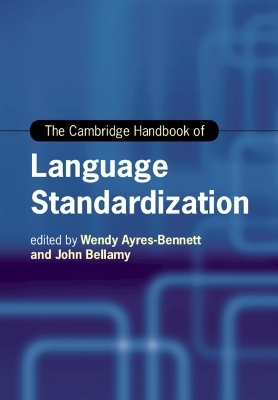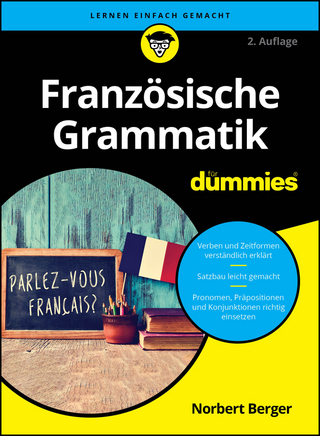
The Cambridge Handbook of Language Standardization
Cambridge University Press (Verlag)
9781108458528 (ISBN)
Language standardization is the process by which conventional forms of a language are established and maintained. Bringing together internationally renowned experts, this Handbook provides a comprehensive overview of standardization, norms and standard languages. Chapters are grouped into five thematic areas: models and theories of standardization, questions of authority and legitimacy, literacy and education, borders and boundaries, and standardization in Late Modernity. Each chapter addresses a specific issue in detail, illustrating it with linguistic case studies and taking into account the particular political, social and cultural context. Showcasing cutting-edge research, it offers fresh perspectives that go beyond traditional accounts of the standardization of national European languages, and affords new insights into minoritized, indigenous and stateless languages. Surveying a wide range of languages and approaches, this Handbook is an essential resource for all those interested in language standards and standard languages.
Wendy Ayres-Bennett is Professor of French Philology and Linguistics at the University of Cambridge. She is Principal Investigator on the AHRC funded multi-disciplinary research project, Multilingualism: Empowering Individuals, Transforming Societies. John Bellamy is Lecturer in Linguistics, Manchester Metropolitan University. He has published extensively on language policy, youth linguistic practices, language attitudes and ideologies.
Introduction Wendy Ayres-Bennett and John Bellamy; Part I. Revisiting Models and Theories of Language Standardization: 1. Modelling language standardization Wendy Ayres-Bennett; 2. Language standardization 'from above' Gijsbert Rutten and Rik Vosters; 3. Language standardization in a view 'from below' Stephan Elspaß; 4. Social cohesion and emerging standards of Hindi in a multilingual context Anvita Abbi; 5. Standardization in highly multilingual national contexts: the shifting interpretations, limited reach, and great symbolic power of ethnonationalist visions Friederike Lüpke; 6. Standardization of minority languages: nation-state building and globalization Minglang Zhou; Part II. Legitimacy, Authority and the Written Form: 7. Standard languages in the context of language policy and planning and language rights Douglas A. Kibbee; 8. State-appointed institutions: authority and legitimacy in the Spanish-speaking world Darren Paffey; 9. Grammars, dictionaries and other metalinguistic texts in the context of language standardization Nicola McLelland; 10. An industry perspective: dealing with language variation in Collins dictionaries Ian Brookes, Mary O'Neill and Merryn Davies-Deacon; 11. The role of literature in language standardization: the case of Italy Nicoletta Maraschio and Tina Matarrese; 12. Standardization, new speakers and the acceptance of (new) standards Michael Hornsby and Noel Ó Murchadha; 13. Creoles and variation Bettina Migge; Part III. Norms, Literacy and Education: 14. Language endangerment and standardization: perspectives from the fourth world Lynn Drapeau; 15. Indigenous languages, standardization, and curricular development: the case of the Māori language mathematics lexicon Tony Trinick and Stephen May; 16. Polynomic standards: the enactment of legitimate variation Alexandra Jaffe; 17. Standard languages and standardization in the context of bilingual education Robert Train and Claire Kramsch; 18. Setting standards for language learning and assessment in educational contexts: a multilingual perspective Antony John Kunnan and Nick Saville; Part IV. Beyond the National: Borders and Boundaries: 19. Transnational standards of languages: the rise and codification of national varieties Raymond Hickey; 20. Standardization across state boundaries: modern Ukrainian as a paradigmatic case Serhii Vakulenko; 21. Language modernization in the Chinese character cultural sphere: China, Japan, Korea and Vietnam Patrick Heinrich; 22. Linguistic norms, centre-periphery dynamics and the tension between uniformity and diversity in processes of standardization Josep Maria Nadal and Francesc Feliu; 23. When ethnic boundaries and language boundaries mismatch: standardization in Mayan languages in multilingual situations Sergio Romero; 24. The standardization of a stateless language Yaron Matras; Part V. Standardization in Late Modernity: Beyond Traditional Standardization: 25. Destandardization Tore Kristiansen; 26. Contemporary perspectives on language standardization: the role of digital and online technologies John Bellamy; 27. Standardization and new urban vernaculars Catherine Miller and Jacopo Falchetta; 28. Renegotiating language norms in minority contexts Noel Ó Murchadha; 29. Sign language standardization Ronice Müller de Quadros and Christian Rathmann.
| Erscheinungsdatum | 04.06.2024 |
|---|---|
| Reihe/Serie | Cambridge Handbooks in Language and Linguistics |
| Zusatzinfo | Worked examples or Exercises |
| Verlagsort | Cambridge |
| Sprache | englisch |
| Maße | 169 x 243 mm |
| Gewicht | 1420 g |
| Themenwelt | Schulbuch / Wörterbuch ► Wörterbuch / Fremdsprachen |
| Geisteswissenschaften ► Sprach- / Literaturwissenschaft ► Sprachwissenschaft | |
| ISBN-13 | 9781108458528 / 9781108458528 |
| Zustand | Neuware |
| Informationen gemäß Produktsicherheitsverordnung (GPSR) | |
| Haben Sie eine Frage zum Produkt? |
aus dem Bereich


